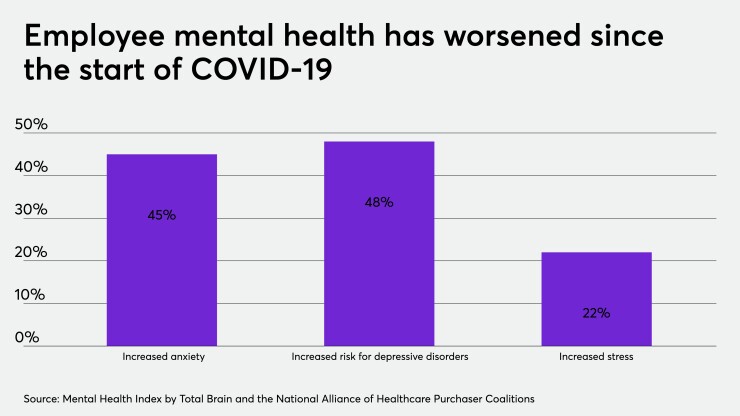Employees are serious about prioritizing their mental health — so much so that they’re willing to pass up more money to do it.
Since the start of the pandemic, 64% of full-time employed adults would choose a company with a less stressful work environment over a 10% higher salary, according to research from the Lincoln Financial Group. Nearly two-thirds of employees say they have left a job in the past or would like to leave their current job because it is not good for their mental well-being.
Employees’ struggle with mental health predates the pandemic, according to Sharon Scanlon, senior vice president and head of customer experience and producer solutions at Lincoln Financial. However, the shift to remote work has
“When we look at well-being and wellness, the number one stressor for employees is financial stress, and that hasn’t changed in the pandemic,” Scanlon says. But rather than asking employers for a pay raise, employees are instead looking for ways to support, take control of and improve their overall mental health.
Read more:
Stress, anxiety, PTSD and depressed moods have all
To get through this new phase in the pandemic, employees are going to need employers’ continued support, according to Scanlon. Moving forward, it won’t be enough to simply offer resources; employers will have to commit to educating their workforce on what is offered and how it works to
Employers could also offset stress using workplace benefits such as disability, accident or critical illness insurance, as well as employer-sponsored retirement plans, Scanlon says.
Read more:
“A good benefits package in your offering is a key part of ensuring that [employees] can work and focus on their mental well-being and their health,” she says. “Offering the right benefits can help employees feel more protected, leading to a healthier and more engaged workforce.”
The shift to a wellness-centric workforce may have been exacerbated by the pandemic, but it has gained staying power, a fact that companies are encouraged to keep top of mind in the following months, according to Scanlon.
“Employers are all competing for the best talent right now,” she says. “[They’re] going to have to step up to meet that employee where they want to be met if they want to attract and retain.”






